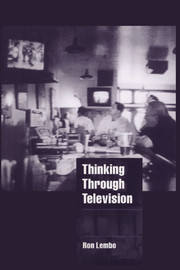Book contents
- Frontmatter
- Contents
- Acknowledgments
- Introduction: Situating my experience with television
- PART I Conceptions of television use
- 1 Social theory
- 2 Social science
- 3 Cultural studies
- PART II Reconceptualizing television use
- PART III Documenting the viewing culture
- Conclusion: The politics of television reconsidered
- References
- Index
3 - Cultural studies
Published online by Cambridge University Press: 22 September 2009
- Frontmatter
- Contents
- Acknowledgments
- Introduction: Situating my experience with television
- PART I Conceptions of television use
- 1 Social theory
- 2 Social science
- 3 Cultural studies
- PART II Reconceptualizing television use
- PART III Documenting the viewing culture
- Conclusion: The politics of television reconsidered
- References
- Index
Summary
Cultural studies looms large in current thinking about television. Seen initially as a growing body of scholarly work inspired by the Centre for the Study of Contemporary Culture at Birmingham, England, nowadays, cultural studies is arguably the most sophisticated of critical approaches to the study of culture. It has focused on the study of cultural practice and power across a wide variety of social settings, both contemporary and historical. Analysts have paid attention to the ways that power orders and organizes even the most mundane aspects of everyday life; and, just as importantly, they have sought to demonstrate how people take issue with power and resist its normalizing influences. Over the years, cultural studies has encompassed wide-ranging work from different disciplines and in this way has become a repository of various terms and constructs that have been used to identify and discuss the workings of social power as something institutional, ideological, discursive, and cultural. Throughout its brief history, the substantive interests and political concerns guiding the work of analysts have changed, reflecting the simultaneous and successive influence of neo-Marxism, structuralism and semiotics, feminism, and, more recently, postcolonial and poststructuralist perspectives. As a result, initial concerns in cultural studies with capitalism and class-based identities and cultural practices have been expanded to include the study of patriarchal power relations, racial and ethnic divisions characteristic of advanced industrial societies, and the investigation of, as well as studies of, postcolonial politics and culture, among other things.
- Type
- Chapter
- Information
- Thinking through Television , pp. 53 - 82Publisher: Cambridge University PressPrint publication year: 2000

